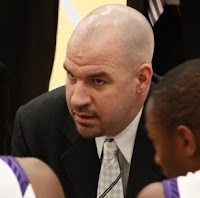 I've had a few people contact me in regards to my "Have a Plan" posting last week. There has been some confusion as to what I was referring to. Just as we have game-plans for our teams, we must also have a life-plan. That life-plan must take into consideration all of the members of our programs. Some simple things to consider:
I've had a few people contact me in regards to my "Have a Plan" posting last week. There has been some confusion as to what I was referring to. Just as we have game-plans for our teams, we must also have a life-plan. That life-plan must take into consideration all of the members of our programs. Some simple things to consider:- Work with the women's team coach to come up with a master calendar of practice times.
- For college coaches, have a master recruiting calendar of games you or your staff would like to see. This is a simple task that can allow the rest of your staff to plan ahead. If you designate a recruiting coordinator, this should be one of his tasks.
- If you choose to proctor study hall sessions for your team, explore times and locations early so that your team and staff are able to plan around them.
- Share a team calendar with your staff, players, support staff, and other important people involved such as professors, academic advisors, tutors, library staff, janitors, etc. This will eliminate the need to improvise. If you employ the player notebook system, players can keep this calendar in their notebooks.
- Post your team calendar in places your team will see it. Outside your office and in the locker room are two very obvious places.
- Conduct individual player meetings to discuss time-management and organization weekly if possible. Include this in the players' calendar.
- Communicate changes in the schedule as early as possible. Have a plan of how to communicate changes and confirm that the message is received.
I think we can all agree that when plans are not made and "last-minute" rules the day, we become extremely frustrated. These are just a few ideas to get the wheels turning. The goal should be to eliminate as much of the "last-minute" through thorough preparation.



